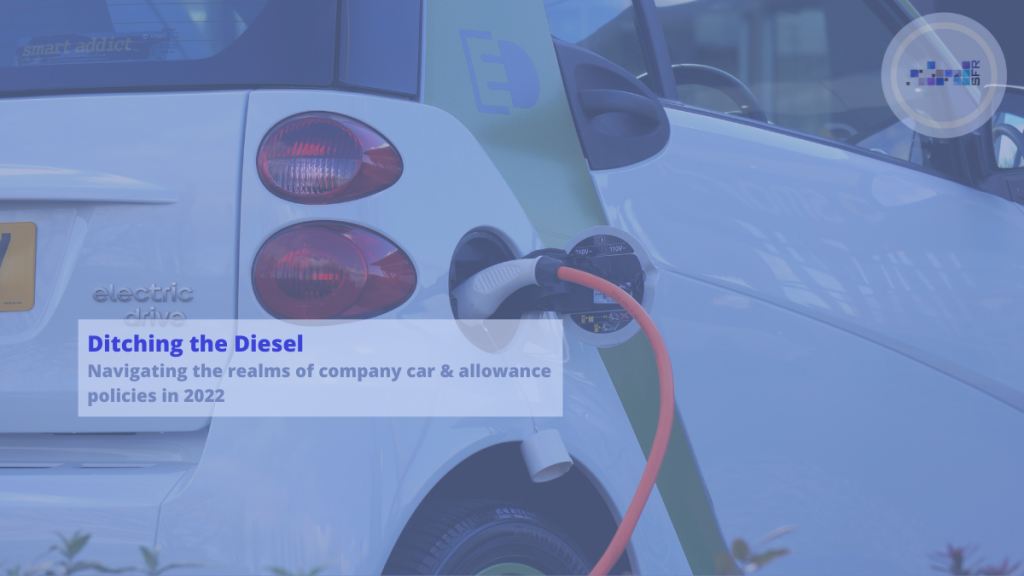Ditching the diesel: Navigating the realms of company car & allowance policies in 2022

Candidates applying for external sales roles are often faced with the challenge of negotiating suitable company car and car allowance packages, as well as the prospect of adjusting to different policies at a new employer.
This challenge is now exasperated by the automotive sector going through rapid change – transitioning itself in order to achieve the Government’s target of zero emissions by 2030 for all new cars and vans sales – resulting in the petrol and diesel cars being phased out.
As hybrids and electric cars are now thrown into the mix, this is creating confusion for both candidates and employers trying to navigate the changes and alter their car policies to remain competitive in the job market, while candidates need to negotiate carefully and consider any car investments and commitments they make very wisely.
SFR Recruitment, as a niche recruiter with a core focus on external sales, key account management, marketing and business development roles, has researched this important topic that, more often than not, can impact on whether a job is ultimately accepted or declined.
Independent Research
Our independent research discovered the following interesting facts and has proved that cars are a very emotive subject. We can see that car allowance is preferred over company car but only slightly. When offered a company car the preference is hybrid or electric, representing 3/4 of the survey responses, showing a huge shift towards a ‘greener’ vehicle choice.
- 34% of candidates prefer a company car
- 41% of candidates prefer car allowance
- 41% of candidates prefer a hybrid car
- 31% of candidates prefer an electric car
- 27% of candidates prefer a diesel/petrol car
Car Choice Considerations
Whatcar.com states that fully electric and hybrids are fast taking over as the smart choices for company car drivers. They predict that over the next few years that shift looks set to accelerate, as benefit-in-kind tax bandings make hybrids (especially plug-in hybrids) very tax efficient. https://www.whatcar.com/news/hybrid-car-company-car-tax/n2261
The main concern being with car choice is ensuring the vehicle is “fit for purpose” – the daily mileage should be within the range of the EV to ensure only an occasional need to charge during the day.
Is it Time to Choose Pure EV or PHEV?
Looking at the research we believe the answer is “yes if you can”.
- EVs have the most attractive BiK rates, however PHEX also attract less tax. A typical PHEV for example can do around 25 miles on battery power alone and will have 49g/km CO2 emissions; such a car would attract a BiK rate of 13% in FY 2021/22.
- A typical petrol car, registered after 6 April 2020 and subject to WLTP tests might emit 132g/km of CO2, attracting a BiK rating of 30%, while a typical RDE2-compliant diesel might emit 120g/km, making its owner liable for a 28% BiK rate.
The tax in kind you will pay on a company car is high especially on diesel vehicles.
Should I take a company car or car allowance?
Most companies tend to offer the one or the other. If you have the choice of either company car or a car allowance at your new job, it often comes down to personal preference. Both options have their pros and cons, and it’s another thing to weigh-up in your job move. Car allowance gives you more freedom in choosing a car, but also comes with more financial responsibilities for maintenance and tax payments over your increased income.
Here’s a useful resource: Company car tax guide 2021/22: everything you need to know.
The Benefits of Going Electric
Courtesy of OSV and HWCA these are the hardcore advantages to going electric:
Environmental option – choosing an EV is also a more environmentally conscious option, making your car usage more sustainable and helping the UK to meet its 2030 target of moving all personal vehicles over to electric.
Home-charging grant – the Government also offers the Electric Vehicle Homecharge Scheme. This scheme provides a 75% contribution to the cost of one chargepoint and its installation, capped at £350 (inclusive of VAT). This helps towards the cost of installing a charging point for your EV at home, allowing you to keep the vehicle charged overnight at cheaper electricity rates.
Low running costs – Once you’ve got your electric vehicle you will quickly see the difference in running costs. If you drive in the city you won’t have to pay congestion charges or Ultra Low Emission Zone charges and you’ve also got much lower running costs.
Lower maintenance costs – Thanks to the fact that electric vehicles have far fewer moving parts than a traditional internal combustion engine vehicle, you will find that when the time comes to get it repaired, your maintenance costs will be much lower.
Plug-in grant for qualifying vehicles – the Government is also currently offering a ‘plug-in grant’ for qualifying EVs that meet the relevant eligibility criteria.
Tax benefits – If you’re driving an EV then you will benefit from lower tax costs, not only are you eligible for £0 Vehicle Excise Duty (road tax) but if the car is for the business, then Company Car Tax is just 1% in 2021. This means company car drivers who choose an EV will save thousands compared with the driver of a comparable diesel.
You can still claim your business mileage – even though you’re not using petrol, you can still claim the government-approved mileage allowance for an EV. The rate per mile will vary where the car is owned by the company or by an employee. The rates can be found here.
Company Car Policies
How to Design an Electric Vehicle Company Car Policy
For a company to stay competitive in terms of the benefits it offers in relation to company cars, they should consider reviewing and updating their policies and, perhaps, consider developing an EV company car policy. Here’s some best practice advice and tips on doing exactly that from The Association of Fleet Professional’s EV, Alternative Fuels and Low Carbon Committee:
Understanding the Tax Advantages of Electric Vehicles
The realms of tax benefits in relation to company cars is an absolute minefield, feast your financial director’s eyes on these resources, consult your accountant, or employ an expert who can design a policy that best suits your employees and bottom-line.
The benefit in kind (BiK) is a percentage of the list price of the car when it was new, and the percentage applied increases in line with the CO2 emissions of the car. This is why many company car drivers are now looking at electric vehicles – either plug-ins or self-charging hybrids – as a tax efficient alternative.
Conclusion
There are many good reasons to ‘ditch the diesel’ and reconsider our motor vehicle choices in general. When considering EVs and PHEVs, ensuring the car is ‘fit for purpose’ is key; choose wisely ensuring the daily mileage is within the range of the EV. When considering PHEVs be prepared for additional maintenance costs and management time. If implemented correctly the introduction of PHEVs should benefit both the employee and employer with significant tax savings, improved environmental and fuel savings, as well as reduce charges in emission-based charging zones.
For rock-bottom benefit-in-kind tax bills, you can’t beat a pure-electric car. But a hybrid is very much the next best thing, especially a plug-in hybrid with a healthy battery-powered range. And switching from a petrol or diesel to a hybrid takes less getting used to than changing to a fully electric car.
PHEVs are more expensive and will attract higher rental rates, however factoring in NI, fuel costs, SMR over life-time of the vehicle they can be significantly cheaper than the traditional ICE. Ensure you check out the whole life cost (WLC) calculations, which are explained on most car manufacturers’ websites such as Volkswagen. https://www.volkswagen.co.uk/en/finance-offers-and-fleet/fleet/whole-life-costs.html
Electric vehicles are very expensive and employers should consider that they will be above most employee’s pay grades. Consider allowing employees to trade-up based on WLC by making a private contribution, thus reducing BiK tax and salary sacrifice schemes for pure EVs only.
Other considerations such as:
- Considerations of salary sacrifice lease plans:
- Charging points in the home – who will pay? Company or employee?
- Claiming tax relief for using privately owned EVs – See Understanding the Tax Advantages
- Employees living in rental accommodation, or no driveway – how will they charge their EV or PHEV
- Declaration from employee to sign to take responsibility for charging effectively at their cost
- Fuel policies can be complex and advice from an accountancy expert should be sought
- Government grants for plug-ins, tax relief for electric and VAT rules for EVs
Indeed, the realms of company car benefits and tax are growing in complexity! Before accepting a role, candidates should consider fully the company car policy or car allowance on offer to them, and when choosing car allowance weigh-up whether car ownership or lease plan would work better for them. SFR Recruitment Solutions supports all of its candidates in securing new roles within the hardware, ironmongery and access control sectors, whilst finding companies all the talent they need to grow their businesses. If you need help securing talent or finding your next role, including car benefits or not, why not reach out to us.
Jargon Buster! Car Terminology that will Blow Your Mind
You may or may not be familiar with these acronyms and terms – there is no escape! ?
BiK – Benefit in Kind is any non-cash benefit of monetary value that you provide for your employee. These benefits can also be referred to as notional pay, fringe benefits or perks.
E-REV – Extended-Range Electric vehicle. Car uses an electric motor, but is also able to use an internal combustion engine to generate power, keeping a minimum level of charge in the battery whenever it gets low. These vehicles help alleviate drivers’ worries about running out of power in electric car.
EV – An electric vehicle. A car that’s largely powered by an electric motor. This can cover everything from E-REVs to Hybrids.
Hybrid – Any vehicle which is powered by both a fuel engine and an electric motor. Many hybrids will jump between the two ‘modes’ when driving conditions are best suited to that particular form of power.
ICE – Internal Combustion Engine
PHEV – Plug-in Hybrid Electric Vehicle. This refers to a type of car with a particularly good range of electric power, owing to a large propulsion battery
Range – The distance any given electric vehicle can travel, from full charge, before it would run out and require charging again.
RDE2 – (formerly RDE) stands for Real Driving Emissions step 2. It’s the new real-world testing procedure that all newly launched cars must meet.
SMR – service, maintenance and repair
WLC – Whole Life Cost
WLTP – Worldwide harmonized Light-duty vehicles Test Procedure
